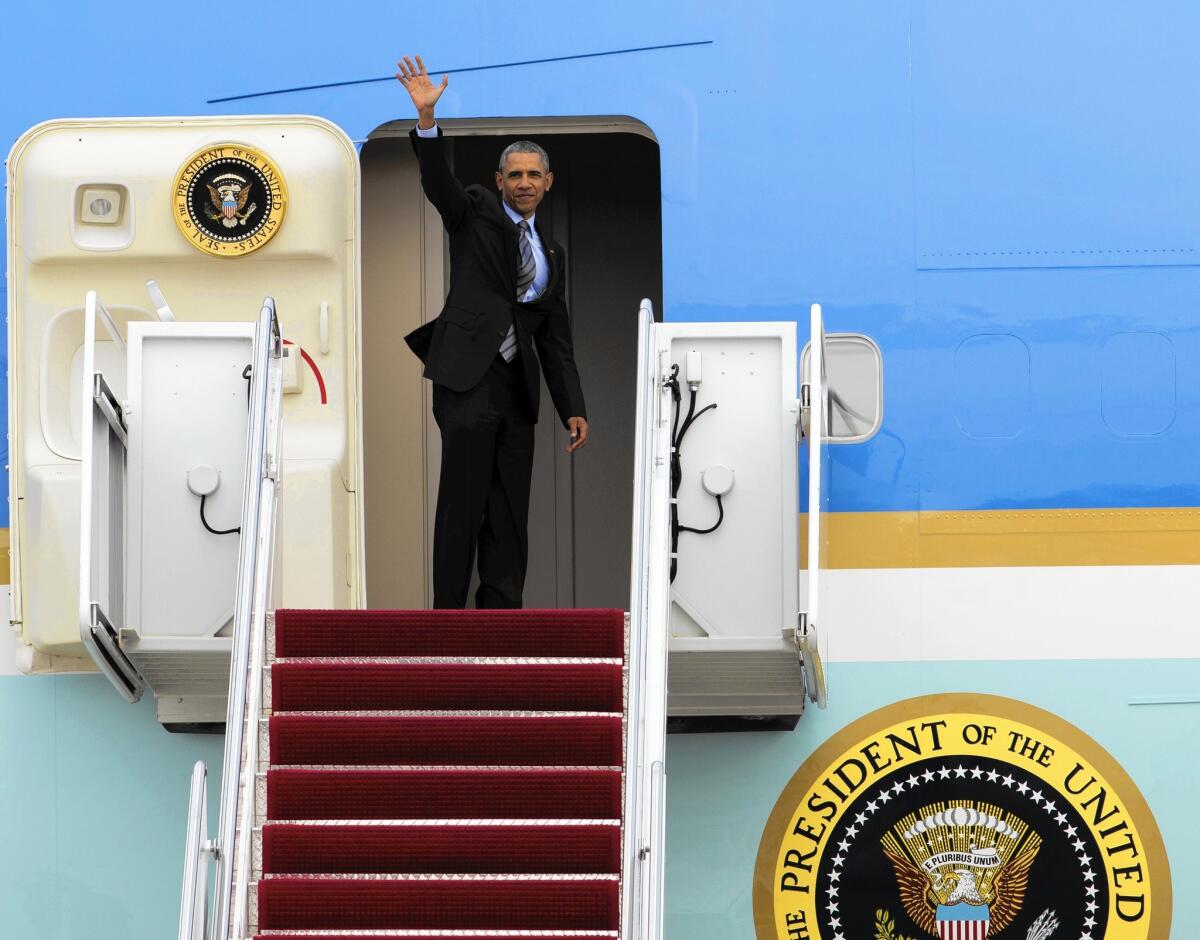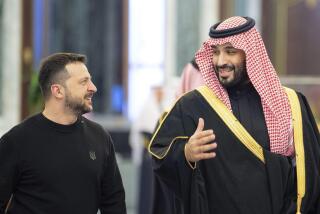Obama goes to Saudi Arabia to rebuild a relationship strained by Iran, Islamic State and 9/11

reporting from WASHINGTON â President Obama begins a delicate mission Wednesday both to reinforce his strategic aims in the Middle East and to ease tension with an aggrieved longtime ally, Saudi Arabia.
Neither will be easy.
After he lands in Riyadh, the Saudi capital, he will meet privately with King Salman, who has clashed with White House efforts on Iran, the wars in Yemen and Syria, and the battle against Islamic State.
The White House characterized the visit as a follow-up to talks in May when Obama hosted the leaders of Americaâs Persian Gulf allies at the presidential retreat at Camp David. Salman stayed home in what diplomats called a snub.
Little came of the summit beyond a flurry of weapons sales, and if anything, the relationship between Washington and Riyadh has grown more troubled.
Four decades of close ties were based on shared views of security in the Middle East, on the U.S. need for Saudi oil and on the Saudi ability to leverage its vast wealth for regional stability. Today there is divergence on all points.
Saudi Arabia considers its rival Iran as the top security threat in the region and is appalled that the Obama administration has begun to engage with Tehran around the landmark nuclear arms agreement signed last year. The White House is more worried about the terrorist threat from Islamic State.
Fracking and more drilling have helped the United States begin to ease dependence on Saudi oil. At the same time, plummeting global oil prices over the last year have begun to choke Riyadhâs economy and its influence.
Obama also will face diplomatic fallout for his remarkably undiplomatic interviews with the Atlantic magazine. A recent piece described him as âirritatedâ that foreign policy orthodoxy requires him to treat Saudi Arabia as an ally.
In the article, Obama criticized âfree ridersâ in the Middle East who turn to the United States for security but donât pull their own weight.
Saudi Arabia, he said, must learn to âshare the neighborhoodâ with Iran, an alarming suggestion for the Saudis and their smaller Sunni Muslim neighbors who fear the Shiite government in Iran.
The White House sought to downplay any divisions with Riyadh and insisted Obama routinely urges other countries to take a greater role in the fight against Islamic State.
There âhave always been complexities,â said Ben Rhodes, the deputy national security advisor. âWe do believe that weâve had good cooperation and enhanced cooperation since the summit last year, but thereâs always room to see what more can be done.â
The relationship âis characterized by extensive counter-terrorism cooperation,â White House Press Secretary Josh Earnest said. âThat cooperation enhances our national security, it makes the American people safer. The Saudi government happens to think that it enhances the national security of their country ⌠and makes the Saudi people safer as well.â
The friction focused new attention on legislation introduced by Sen. Charles E. Schumer (D-N.Y.) last year that could allow Americans to sue the Saudi government in U.S. courts for its suspected support for some of the Sept. 11 hijackers, a claim Riyadh has staunchly denied.
Obama said Monday on âCBS This Morningâ that he opposes the legislation because it would open the U.S. government to suits from foreign citizens.
The Saudis have reportedly threatened drastic economic retaliation if the bill is enacted into law, including a potentially destabilizing sell-off of hundreds of billions of dollars in U.S. debt and other assets.
Partly as a result, the State Department issued a travel warning for Americans considering trips to Saudi Arabia.
Evidence that Saudi officials may have aided some of the hijackers reportedly is included in a still-classified 28-page segment of the official Sept. 11 report. Obama said James R. Clapper, director of national intelligence, is reviewing the section and will release it if it can be declassified.
Another toxin in the relationship was the Obama administrationâs failure to support Egyptian President Hosni Mubarak, a Sunni strongman overthrown in the 2011 âArab Springâ revolt that eventually gave way briefly to an Islamic government.
Similarly, Obamaâs declaration of a âred lineâ if Syrian President Bashar Assadâs forces used chemical weapons â and then Obamaâs refusal to bomb when they did so â deepened a crisis of confidence among the Persian Gulf states, diplomats say.
No U.S. relationship has shifted more fundamentally during Obamaâs tenure than that with Saudi Arabia, said Vali Nasr, dean of the Johns Hopkins School of Advanced International Studies in Washington.
The Saudis and other gulf leaders are trying to ascertain whether the change will last beyond the Obama administration.
âTheyâre counting on it not,â Nasr said.
In recent months, Saudi Arabia has made a point of reasserting its leadership in the region.
Salman made high-profile trips to Egypt and Turkey, where he brokered a long-delayed rapprochement between the two countries and took custody from Egypt of two islands in the Red Sea. Last weekend, Saudi Arabia backed out of a major OPEC deal that would have granted Iran a larger share of the market.
The kingdom has executed dozens of accused terrorists, including a prominent Shiite cleric whom the U.S. has asked be spared, and mobilized a 34-nation Islamic military alliance against Iran.
âSaudi Arabia wants to continue to remind [Washington] of its influence, importance and power and not be taken for granted,â said Nasr, a former senior State Department advisor.
Though the relationship has soured, no one predicts a breakup.
The U.S. provides crucial intelligence to Saudi Arabia in neighboring Yemen, where Saudi airstrikes and ground forces are supporting the ousted government against Iran-backed Houthi rebels.
The Saudis have also joined the U.S. in assisting some of the Syrian militias arrayed against Assad and in getting them to peace talks in Geneva.
On Thursday, Obama will take part in a summit in Riyadh with the other gulf nations. Aides said he will press the gulf states to take a greater role in efforts to defeat Islamic State.
âWe think these fights are best fought by local partners,â said Rob Malley, a senior director on the National Security Council for the Middle East. âThere is sometimes room for external forces, but it has to be done in a smart way.â
Malley said the administration also will work with Arab partners to look at de-escalating regional conflicts, not only in Syria but also in Yemen.
âThe fight in Yemen has distracted from the crucial fight against [Islamic State] and against Al Qaeda,â he said.
Analysts say the Saudisâ loss of trust in the U.S. government is deep and perhaps permanent.
âThere is a real crisis of confidence, and no amount of summitry is going to change that,â said David Weinberg, a senior fellow at the Foundation for Defense of Democracies who specializes in the gulf region.
âThereâs no state in this region that doesnât have serious questions about U.S. policy and U.S. support and where the U.S. role in the region is headed,â said Anthony Cordesman, a national security expert at the nonpartisan Center for Strategic and International Studies.
More to Read
Sign up for Essential California
The most important California stories and recommendations in your inbox every morning.
You may occasionally receive promotional content from the Los Angeles Times.












